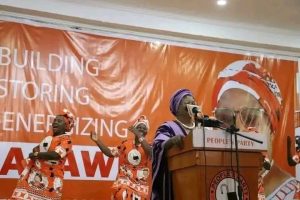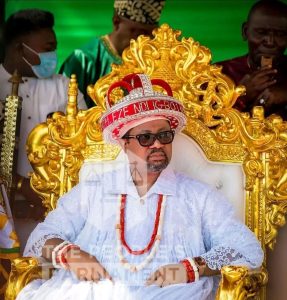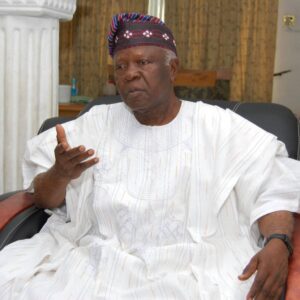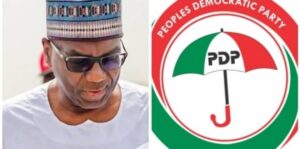FIWON Decries Poor Social Service In Nigeria, Tasks Govt. On Education Budget
The Federation of Informal Workers’ Organizations of Nigeria (FIWON) has scored Nigerian government low on the provision of social service. The informal workers added that unlike many other African countries, Nigeria’s budgetary allocations to education is alarmingly low and that this has negative effects on the overall development in Nigeria. Marking this year’s World Cities Day, the group tasks government at all levels to redress this anormally. Below is the full text of the Press Statement by the Federation of Informal Workers’ Organizations of Nigeria (FIWON) on the Occasion of the 2018 UN World Cities Day:
October 31 every year is designated by the United Nations system to promote public interest in urbanization, draw attention to challenges of urbanization with a view to contribute to sustainable urban development. Given the rapid rate of urbanization in most developing countries including Nigeria, it has been become imperative that governments and the general public be concerned about sustainable, resilient and equitable development of our cities. For instance, Nigeria’s population growth rate is about 2.8%–3% a year meaning that Nigeria’s urban population will double in the next two decades signaling the need for more imaginative democratic response to the challenge of leaving just too many people behind. The five key areas demanding attention in the rapidly growing cities include climate change, upgrading informality, economic and social resilience, governance and decentralization, humanitarian urban crisis.
The Federation of Informal Workers’ Organizations of Nigeria (FIWON) as an organization representing self employed, informal workers is particularly concerned about the plight of these categories of working people in our urban conundrum. The reality is that informality characterize every facet of life in all our cities as citizens find ways and means of providing for themselves even the most basic municipal services that are historically provided by government, especially the local, municipal government. The collapse of the local government tier of governance in recent decades, has also ensured that basic education, sanitation, water provision, spaces for local trade and commerce, innovation and entrepreneurship are being whimsically taken over by private providers that are obviously disconnected from the needs of local populations.
The continued forced evictions of informal workers from their work places and informal settlements in Nigerian cities, especially Lagos, the largest urban conurbation in Africa today, raise grievous questions about the social content of our democracy. The gentrification and elitist orientation of city planning towards towards construction of little islands of opulent neighbourhoods amidst vast seas of squalor calls for concern. The wanton destruction of Otodo Gbame community recently follows the same tradition of whimsical and oppressive displacement of the poor; Maroko, Ijora Badia, Idasho, Ilubinrin and Ikate Elegushi among others. Also, scores of markets in Sandgrouse, Oshodi, Isolo, Ikeja, Ile-Epo etc have been demolished with hundreds of thousands of traders displaced. As it is with the traders, so also it has been with mechanics and other informal workers.
The fact that over 75% of the economically active population in our cities define their existence through informal work and that they access critical services informally as well demands that government’s attitude to development must be comprehensively reviewed. The claim to modernization is easily debunked when it is realized that what is happening in most of our cities is not carefully constructed development initiatives but systematic plunder of urban spaces occupied by the poor for the super rich in a process or urban gentrification that only satisfies neo-liberal interests. The situation in Lagos where an existing sanitation system was recently dismantled in favour of big business interests and moves were made to shift property taxation from municipal purview to the state government while citizens effort to provide borehole water for use in the absence of a public water system, was to be subjected to taxation, show a total disregard to the global campaigns for an inclusive urbanism.
At 4.9% urbanisation rate, Nigeria lags behind in the provision of housing with an estimated deficit of estimated 17 million units of housing. This is not a surprise because the colonial and post colonial military and civilian governments except for brief flashes of committed investment in social housing as in the 1979 – 1983 Jakande era in Lagos, governments have provided housing only for the relatively wealthy. The most recent urban housing scheme formulated by the Lagos State government; the Lagos Home Ownership Mortgage Scheme (Lagos Homs) is particularly petrifying. Beneficiaries of the scheme can only pay back monthly in a setting where over 80% earn their livelihoods informally, day by day and actually build their homes through daily savings. It must be possible to creatively design a home refinancing method that accommodate the reality of daily savings.
Lagosians are often befuddled by developments in their city with new residential estates springing up without tarred access roads and appropriate drainage canals for flood water. Trucks especially those ferrying highly inflammable hydro carbons crisscross residential areas while permanently blocking off major road arteries and occasionally exploding into balls of fire roasting trapped people in suffocating traffic gridlocks, to death.
We use this occasion of the World Cities Day to call for:
Increased Spending on Social Services: it is tragic that Nigeria continually devotes paltry resources to social services. In 2018, only 7.04% of the 8.6 trillion budget was allocated to the education sector. (https://www.premiumtimesng.com/news/top-news/248663-2018-budget-buhari-allocates-7-education.html.) This compares very poorly with other African countries. Kenya devoted 23.1% of the entire 2018 budget to education. South Africa, in the 2017/2018 fiscal year budgeted 17% of total government expenditure for school children alone while Ghana allocated 19.2% of her total budget to education in the same period. The previous year, the government had spent 20.7% on education.
Similarly, the 2018 budgetary allocation to the health sector in Nigeria at 3.9 percent of the total budget is a far cry from the recommendation of the Abuja Declaration which commits African Union countries to allocating at least 15% of their budget “to improve the health sector”. According to the World Health Organization, Nigeria is rated 187th out of 191 countries in terms of health care delivery. Also, one-third of more than 700 health facilities have been destroyed in the country and about 3.7 million people are in need of health assistance. Nigeria also ranks third highest in infant mortality rate in the world! (https://www.healthnews.ng/heres-breakdown-nigerias-2018-budgetary-allocation-health/). Again, this compares poorly with several African countries with The Gambia, Malawi, Swaziland and Ethiopia committing average of 15.7% of their budgetary allocation to the health sector. (See Here’s a breakdown of Nigeria’s 2018 Budgetary Allocation to Health, Adepoju, Paul, 2017 in https://www.healthnews.ng/heres-breakdown-nigerias-2018-budgetary-allocation-health/.)
The situation for potable water supply and sanitation which are a necessity for good health and well being of all humans is no less critical with about 57 million Nigerians still drinking water from rivers, lakes, ponds, streams and irrigation canals according to a United Nation Children’s Fund, UNICEF, specialist, Moustapha Niang (see Over 57 million Nigerians lack access to potable water – UNICEF https://www.premiumtimesng.com/news/more-news/241232-15-million-nigerians-lack-access-potable-water-unicef.html). Investment in these critical sectors will improve the living and working conditions of informal workers, free scarce resources presently spent to access these services from private providers who do so very inefficiently and generally improve the national human capital base for development and assure peace and social cohesion. It has been observed that that the Boko Haram insurgency in the Northeastern part of the country would not have festered if there was no pool of 11 million out of school street children for the Islamic extremists to draw from.
Decentralization of local, municipal services: It is imperative that municipal governance be reinvented in Nigeria so that the gaping infrastructural deficits in the inner cities presently rotting away can be revamped. There is no way state governments can continue to take over the responsibilities of local governments, it has only resulted in the neglect of basic services in the inner city localities.
Recognizing Organizations of Working People: It is sad that state governments often seek to control the self organizing effort of working people at the grassroots. Informal workers’ organizations are often subverted, divided and intimidated to support policies that are outrightly damaging to their interests. The better approach should be to encourage and recognize such organizations and incorporate their contribution into development programmes.
Gbenga Komolafe
General Secretary
Signed








